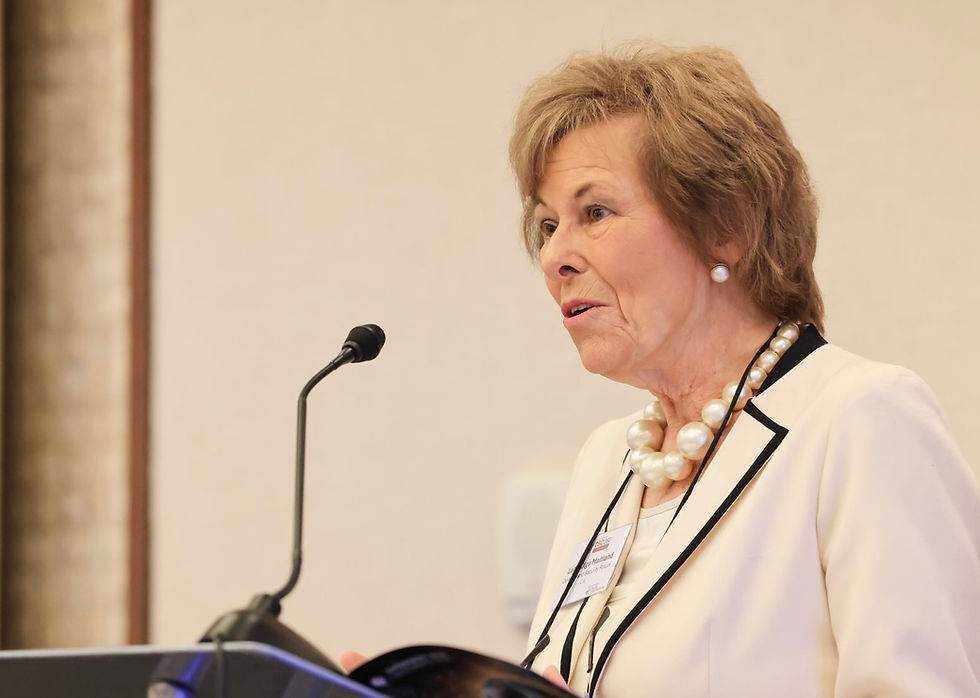Saudi Arabia's Role in the World
- noahbergman3
- May 20, 2025
- 3 min read
Defence and Security Forum Dinner, 7 May 2025, London
Speaker: H.E., HRH Prince Khalid Bin Bindar Al Saud Kingdom of Saudi Arabia Ambassador
Moderator: Rt. Hon. Sir Malcolm Rifkind, KCMG, KC, former Foreign Secretary and Defence Secretary
Presiding: Major General Patrick Cordingley, DSO, and Lady Olga Maitland
Report by Emily Claessen, May 2025

H.E., HRH Prince Khalid Bin Bindar Al Saud with Lady Olga Maitland
As neighbouring countries such as Syria, Yemen, and Sudan continue to face internal turmoil, Saudi Arabia has found itself playing a central role in an increasingly fragmented Middle East. Riyadh is repositioning itself as a key mediator and stakeholder - balancing old alliances with the West while building new ties elsewhere. This shift comes as traditional Western partners show less consistency in their regional policies, but Saudi Arabia hasn’t abandoned these relationships. Its ongoing cooperation with countries including the United Kingdom reflects a careful strategy: stay grounded in long-standing partnerships but stay flexible enough to adapt to a rapidly changing world.
Strategic Pragmatism
Saudi Arabia is rebranding itself not as non-aligned, but "multi-aligned”, and is “not big enough to lead, but too important to ignore.” It is a bridge: geographically between continents, spiritually as the home of Islam, and diplomatically as a country that speaks to both the East and the South in ways the West can’t.
This pragmatism translates into complex relationships. Riyadh maintains working ties with Russia and China, despite ideological differences, because mutual need often supersedes idealism. Lofty ideals are useless without results, and the Kingdom's mediation efforts - including negotiating the release of foreign fighters from Russia – are examples of realpolitik diplomacy with humanitarian dividends.
Development in the Desert
At home, Saudi Arabia is undergoing an ambitious transformation. The much-publicised Vision 2030 has given rise to mega-projects like NEOM and The Line - futuristic developments aimed at leapfrogging urban design and sustainability. These are responses to real threats: climate change, youth unemployment, and resource constraints.
What the world often misunderstands is that Saudi Arabia’s rapid modernisation is rooted in necessity. The country is facing a demographic surge and must create opportunities for millions of young Saudis. With a survivalist Bedouin heritage and a newfound spirit of “communalism”, Saudi Arabia is reimagining what development looks like in the desert.
The Syrian and Palestinian Quandaries
Having invested significant political and financial capital in attempts to rehabilitate war-torn Syria, Saudi Arabia is now focusing on stability before elections or Western-style reforms. The regime’s past betrayals have tempered expectations, but engagement remains key.
In terms of Palestine and Israel, Saudi Arabia’s long-standing peace offer - from the 2002 Arab Peace Initiative - remains on the table. However, normalisation with Israel is now viewed through a cost-benefit lens. Riyadh recognises that Israel stands to gain disproportionately from formal ties, and has insisted on American guarantees to balance the scales. Crucially, any deal must also tangibly benefit Palestinians.
Riyadh’s Diplomatic Role
Saudi Arabia’s diplomatic dexterity has quietly made it a trusted interlocutor in some of the world’s most volatile conflicts. From the India-Pakistan standoff to Russia-Ukraine, Riyadh’s credibility stems not from choosing sides, but from being trusted by both. Unlike the U.S. or China, Saudi Arabia can move nimbly, engaging adversaries simultaneously and constructively. This flexibility extends to regional partnerships. Jordan, for example, is a model of pragmatism and survival, and the Kingdom continues to strengthen ties with both India and Pakistan - balancing Islamic affinity with economic rationalism.
The Long-Term Vision
Crown Prince Mohammed bin Salman is focusing Saudi Arabia’s direction “like a laser.” Where once the country drifted toward disaster, it now surges with youthful energy and ambition. Yet for now, Saudi Arabia’s blend of calculated pragmatism, energetic modernisation, and global engagement positions it uniquely in an unstable world. It may lack the power to dictate global affairs, but as both a facilitator and buffer, it is increasingly indispensable to them.
By Emily Claessen
May 2025



Comments